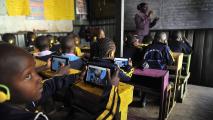For years, delivering mail in the favelas of Rio de Janeiro was a headache. To understand why, try zooming in on this Google Map of the 70,000-person community in southeast Rio de Janeiro:
Google Maps shows a handful of streets, but there are actually thousands of paths throughout the favela. Zoom in as close as you can, and you still won’t see them — and certainly no house numbers.
That’s because the physical structure of the favelas is in constant flux. Buildings are constantly growing up and out, while residents and businesses move in and out. This disorder is also what makes favelas so visually striking.
For decades, the physical flux of the favelas made it impossible for an emerging middle class to participate in commerce.
“The Brazilian government is not required to give people addresses there, so they don’t,” says Giles Rhys Jones. “Yet these people are emerging middle class, they have disposable income, they have Internet connections; they just can’t (get) things delivered to them.”
“(T)hese people are emerging middle class, they have disposable income, they have Internet connections; they just can’t (get) things delivered to them.”
Jones works for what3words, a mapping startup that wants to give an address to every place in the world. The company has been working in the Rocinha and Rio’s other favelas for several years. They got involved when a local delivery service called Carteiro Amigo, or Friendly Mailman, discovered the app.
Friendly Mailman’s system was crude, but effective. Employees made descriptive maps of the favela based on descriptions of the landscape. If something changed in a neighborhood, the company could still find a residence based on what hadn’t changed. In a 2014 profile, Motherboard described the Friendly Mailman’s system as basically dizzying:
Without a visual image, they created a pseudo-code, an informal language of categories to explain each fixed structure, natural or built, which is on each street, stairs, or alley inside the huge Rocinha community. For example, a “condominium” is defined as a blind alley with less than 12 homes.
A typical sequence goes like this: “Wall, stone, henhouse, store, house, building, condominium,” Pedro explains. Each one of these concepts has the same specific definition that makes their work easier. “Rocinha is constantly under construction,” he adds. “It is possible that a month from now a henhouse is gone and there is a house there instead. For this reason we need to register everything; it’s easier to make changes when we need to.”
But an address system that can only be understood by the people who came up with it isn’t as helpful as one that can be understood by everyone. So when the folks at Friendly Mailman discovered What3Words, they were hooked.
What3words is premised on the idea that you can break the entire globe into small squares, assign each square a three-word name, and then cross-reference those squares with latitudinal and longitudinal coordinates. The three words–which are specific to the language of the people using them–make the addresses memorable and easy to communicate, while the coordinates locate the square in the real world. You can see what three words are assigned to your address with their tool:
And unlike GPS, it’s hard to mix up a what3words address. “We use an algorithm to keep similar-sounding addresses very far apart,” Jones says. “‘Table chair lamp’ is in America and ‘table chair damp’ is in Australia.”
And in Rio, it was used over the last few weeks by favela residents and Olympics participants. “If you’re a national association or a government and you’ve got athletes and visitors in Rio, and there’s an incident of some sort, and they might need to direct security or a driver, they can now do that with a three-word address. First responders find it much easier to shout out a three-word address down the radio rather than a latitude/longitude address.”
It’s also important to note what what3words isn’t : “We’re not a navigation system, we’re a point-reference system. We’re a way of talking about a location”–not how to get there. But that actually works to what3words’ advantage: They don’t need to beat Waze or Google Maps, they just need to be added to them. They’ve already been integrated into Duck Duck Go, a pro-privacy search engine that doesn’t record user behavior.
“There are four billion people in the world who don’t have a home address,” Jones says. “They can’t vote, they can’t get aid, and they don’t have rights, because they’re invisible to the state. We’re a commercial concern, but we also want to make the world a better place. If we can give those people an identity by giving them an address, that’s the first step.”




